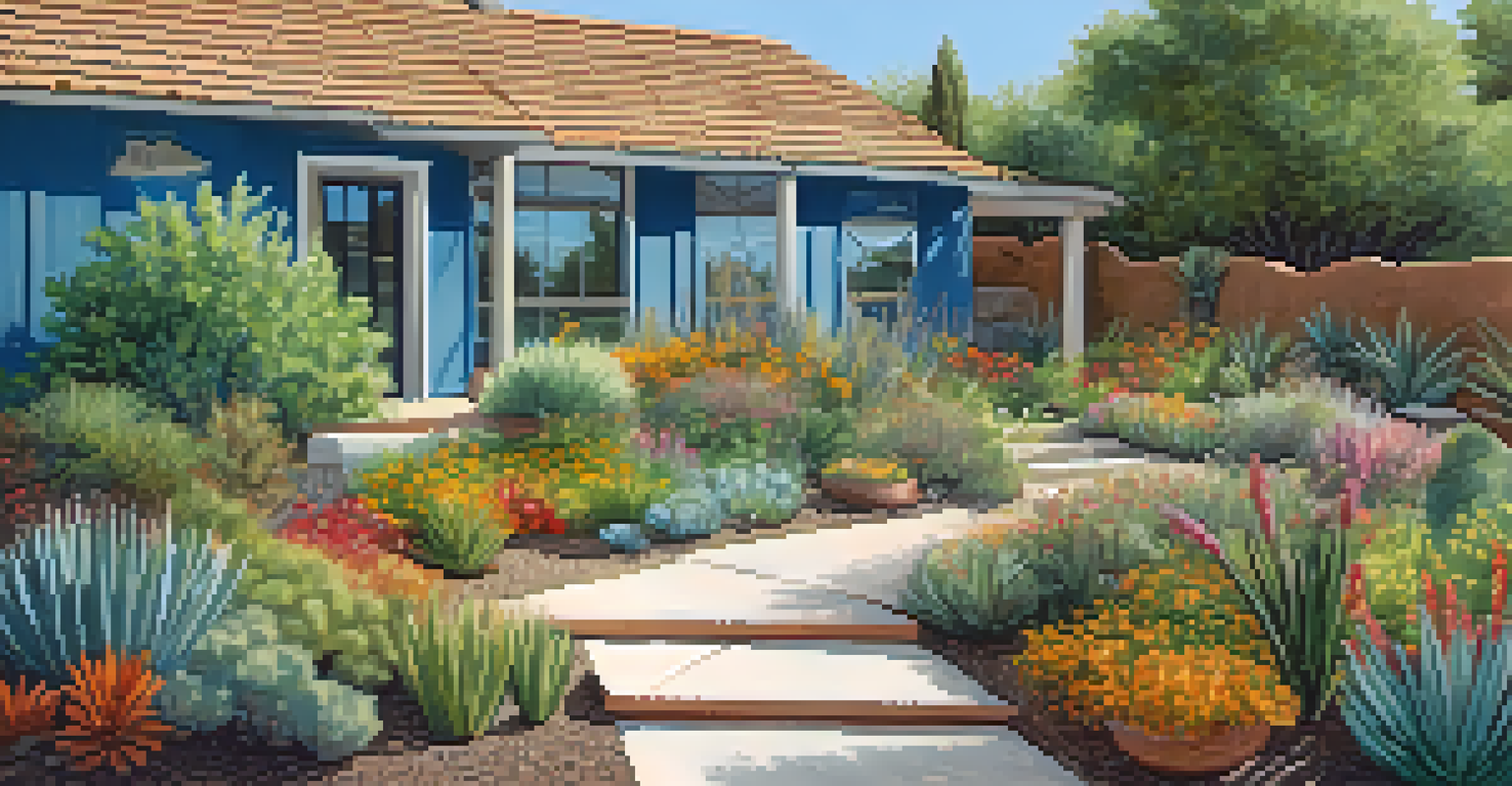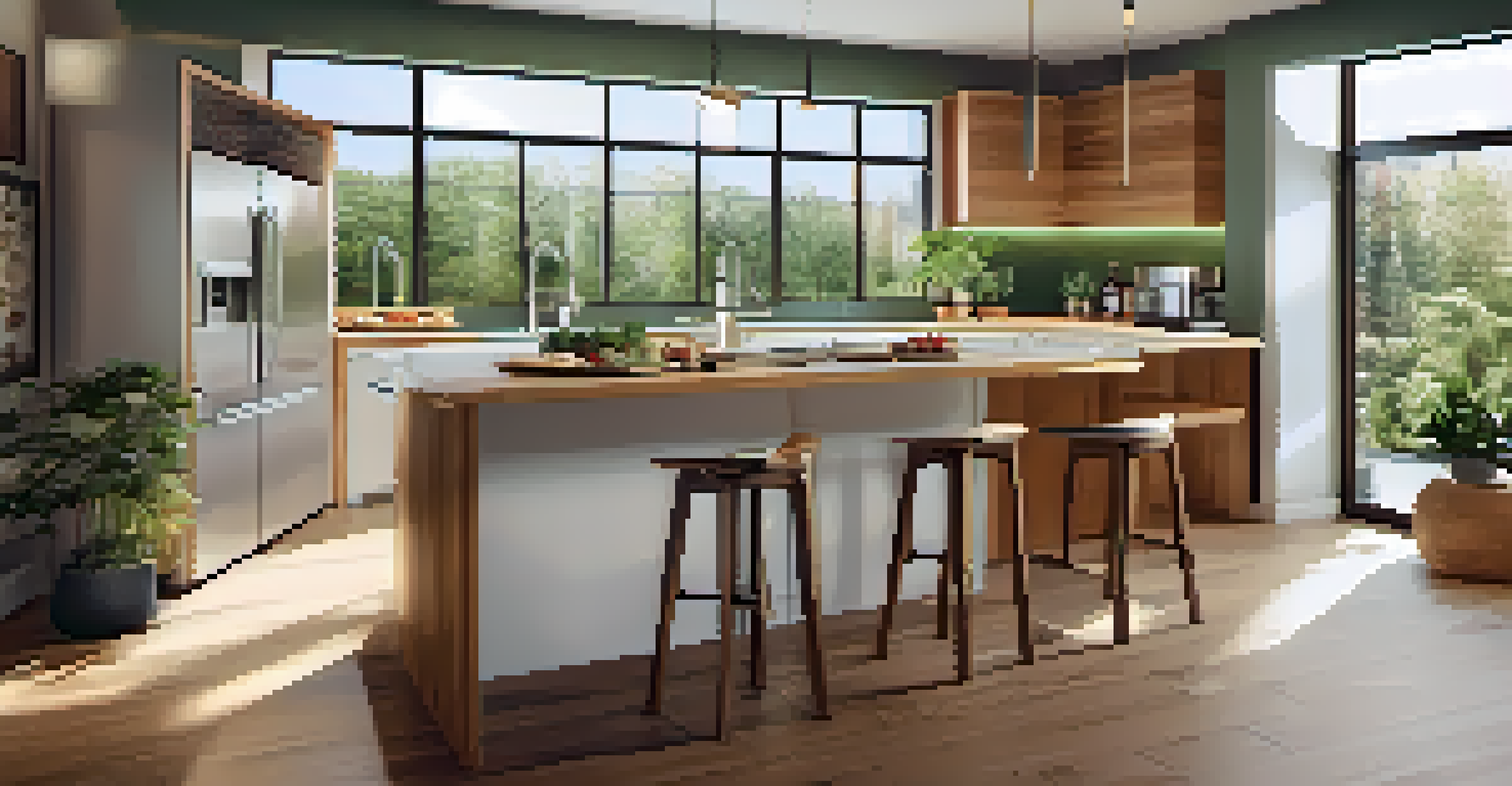Sustainable Home Renovation: A Step-by-Step Approach

Understanding Sustainable Home Renovation Basics
Sustainable home renovation focuses on enhancing your living space while minimizing environmental impact. This means using eco-friendly materials, conserving energy, and reducing waste during the renovation process. Think of it as giving your home a makeover that not only looks great but is also kind to the planet.
The greatest threat to our planet is the belief that someone else will save it.
When considering sustainable options, it's essential to understand which materials are renewable, recyclable, and energy-efficient. For example, bamboo flooring is a fantastic alternative to traditional hardwood, as it grows quickly and is durable. Furthermore, utilizing low-VOC (volatile organic compounds) paints can improve indoor air quality while being safer for your family.
Ultimately, sustainable renovation is about making smarter choices that benefit both you and the environment. By prioritizing sustainability, you can create a home that reflects your values and contributes positively to the world around you.
Setting a Sustainable Renovation Budget
Budgeting for a sustainable renovation is crucial for ensuring you stay on track without overspending. Start by outlining your renovation goals and the sustainable features you want to incorporate. This could include solar panels, energy-efficient appliances, or sustainable materials, which might require an upfront investment but can save you money in the long run.

Consider researching local incentives and grants that promote green renovations, as many governments offer financial support for eco-friendly upgrades. Additionally, keep in mind that sometimes, opting for sustainable options may have a higher initial cost but can lead to lower utility bills and increased home value over time.
Embrace Eco-Friendly Materials
Choosing renewable, recycled, or locally sourced materials can significantly reduce your home's environmental impact.
Finally, create a detailed budget that encompasses all aspects of the renovation, including materials, labor, and any potential permits. This will help you make informed decisions and prevent financial surprises down the line, allowing you to focus on transforming your home sustainably.
Choosing Eco-Friendly Materials for Renovation
Selecting the right materials is one of the most impactful choices you can make during a sustainable renovation. Focus on materials that are renewable, recycled, or locally sourced to reduce your carbon footprint. For instance, reclaimed wood not only adds character to your space but also helps divert waste from landfills.
Sustainability is no longer about doing less harm. It’s about doing more good.
Another option to consider is using sustainable insulation materials, such as sheep's wool, cellulose, or recycled denim. These materials can enhance energy efficiency by keeping your home warm in the winter and cool in the summer, ultimately leading to lower energy bills and a smaller environmental impact.
Lastly, don't forget about fixtures and finishes! Opting for low-flow toilets, energy-efficient lighting, and eco-friendly countertops can significantly enhance your home's sustainability. By making thoughtful choices, you can create a beautiful space that reflects your commitment to the environment.
Incorporating Energy Efficiency into Your Renovation
Energy efficiency is a key component of sustainable home renovation, as it helps reduce energy consumption and lower utility bills. Begin by assessing your home's current energy usage and identifying areas for improvement, such as upgrading insulation, sealing drafts, and installing energy-efficient windows.
Consider investing in energy-efficient appliances that have the ENERGY STAR label, which indicates they meet specific energy-saving criteria. These appliances not only help reduce your carbon footprint but can also lead to significant savings over time, making them a smart choice for your renovation.
Incorporate Energy Efficiency
Upgrading to energy-efficient appliances and systems not only lowers utility bills but also supports a sustainable lifestyle.
Additionally, integrating renewable energy sources, like solar panels or wind turbines, can further enhance your home's energy efficiency. This step not only benefits you financially but also contributes to a healthier planet, making your home a shining example of sustainable living.
Planning for Water Conservation Features
Water conservation is an essential aspect of sustainable home renovation, especially in areas prone to drought. Start by evaluating your current water usage and identifying opportunities to reduce waste, such as installing low-flow fixtures and dual-flush toilets. These upgrades can significantly decrease water consumption without sacrificing performance.
Rainwater harvesting systems are another innovative option for conserving water. By collecting rainwater for irrigation or other non-potable uses, you can reduce reliance on municipal water sources and lower your water bills, all while helping the environment.
Moreover, consider landscaping with drought-resistant plants and employing xeriscaping techniques to minimize water usage in your garden. By incorporating these features, you can create an eco-friendly oasis that conserves water and enhances your home's overall sustainability.
Smart Home Technology for Sustainable Living
Incorporating smart home technology into your renovation can greatly enhance sustainability and efficiency. Smart thermostats, for example, allow you to control your home's temperature remotely, ensuring you're not wasting energy when you're away. This not only keeps you comfortable but also reduces your energy consumption.
Additionally, smart lighting systems enable you to automate your lights to turn off when not in use or adjust based on natural light levels. These systems can significantly cut down on electricity usage and make your home more energy-efficient.
Plan for Water Conservation
Implementing water-saving fixtures and rainwater harvesting systems helps conserve water and promotes eco-friendly practices.
Lastly, consider smart water management systems that monitor your water usage and alert you to leaks or wasteful practices. By utilizing technology, you can make informed decisions that promote sustainable living while enjoying the convenience of modern advancements.
Working with Professionals for Sustainable Renovation
Partnering with professionals who specialize in sustainable renovation can elevate your project and ensure you're making the best choices. Look for architects, contractors, and designers who prioritize eco-friendly practices and have experience with green building techniques. They can provide valuable insights and help you navigate the complexities of sustainable renovation.
When interviewing potential professionals, ask about their experience with sustainable materials, energy-efficient systems, and local building codes. A knowledgeable team will be able to recommend the best solutions tailored to your specific needs and budget, making the renovation process smoother and more successful.

Moreover, collaborating with professionals who share your commitment to sustainability can lead to innovative ideas and creative solutions that you might not have considered. This partnership can transform your vision into reality, resulting in a home that reflects your values and contributes positively to the environment.
Celebrating Your Sustainable Home Renovation Success
Once your sustainable home renovation is complete, it's time to celebrate your hard work and the positive impact you've made. Take a moment to appreciate the eco-friendly changes you've implemented, from energy-efficient appliances to water-saving fixtures. Not only have you enhanced your living space, but you've also contributed to a healthier planet.
Consider sharing your journey with friends and family, inspiring them to embark on their own sustainable renovation projects. You can even host an open house to showcase your newly renovated space and discuss the benefits of sustainable living. This can be a great way to build a community of like-minded individuals who share your passion for the environment.
Ultimately, your sustainable home renovation is more than just an aesthetic upgrade; it's a commitment to a greener lifestyle. By celebrating this achievement, you not only acknowledge your efforts but also encourage others to consider the benefits of sustainable living in their own homes.